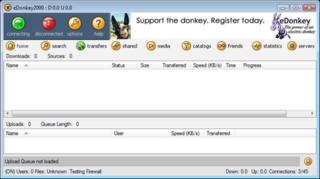
eDonkey2000 was a peer-to-peer file sharing application developed by US company MetaMachine, using the Multisource File Transfer Protocol. It supported both the eDonkey2000 network and the Overnet network.

MPlayer is a free and open-source media player software application. It is available for Linux, OS X and Microsoft Windows. Versions for OS/2, Syllable, AmigaOS, MorphOS and AROS Research Operating System are also available. A port for DOS using DJGPP is also available. Versions for the Wii Homebrew Channel and Amazon Kindle have also been developed.
MLDonkey is an open-source, multi-protocol, peer-to-peer file sharing application that runs as a back-end server application on many platforms. It can be controlled through a user interface provided by one of many separate front-ends, including a Web interface, telnet interface and over a dozen native client programs.

wxWidgets is a widget toolkit and tools library for creating graphical user interfaces (GUIs) for cross-platform applications. wxWidgets enables a program's GUI code to compile and run on several computer platforms with no significant code changes. A wide choice of compilers and other tools to use with wxWidgets facilitates development of sophisticated applications. wxWidgets supports a comprehensive range of popular operating systems and graphical libraries, both proprietary and free.

Audacity is a free and open-source digital audio editor and recording application software, available for Windows, macOS, Linux, and other Unix-like operating systems.

Skencil, formerly called Sketch, is a free software vector graphics editor, released under the GNU Lesser General Public License.

aMule is a free peer-to-peer file sharing utility that works with the eDonkey network and the Kad network, offering similar features to eMule and adding others such as GeoIP. On August 18, 2003 it was forked from the xMule source code, which itself is a fork of the lMule project, which was the first attempt to bring the eMule client to Linux. These projects were discontinued and aMule is the resulting project, though aMule has less and less resemblance to the client that sired it.

Fast Light Toolkit (FLTK) is a cross-platform widget library for graphical user interfaces (GUIs), developed by Bill Spitzak and others. Made to accommodate 3D graphics programming, it has an interface to OpenGL, but it is also suitable for general GUI programming.

wxPython is a wrapper for the cross-platform GUI API wxWidgets for the Python programming language. It is one of the alternatives to Tkinter. It is implemented as a Python extension module.
The eDonkey Network is a decentralized, mostly server-based, peer-to-peer file sharing network created in 2000 by US developers Jed McCaleb and Sam Yagan that is best suited to share big files among users, and to provide long term availability of files. Like most sharing networks, it is decentralized, as there is no central hub for the network; also, files are not stored on a central server but are exchanged directly between users based on the peer-to-peer principle.

FrostWire is a free and open-source BitTorrent client first released in September 2004, as a fork of LimeWire. It was initially very similar to LimeWire in appearance and functionality, but over time developers added more features, including support for the BitTorrent protocol. In version 5, support for the Gnutella network was dropped entirely, and FrostWire became a BitTorrent-only client.

Code::Blocks is a free, open-source, cross-platform IDE that supports multiple compilers including GCC, Clang and Visual C++. It is developed in C++ using wxWidgets as the GUI toolkit. Using a plugin architecture, its capabilities and features are defined by the provided plugins. Currently, Code::Blocks is oriented towards C, C++, and Fortran. It has a custom build system and optional Make support.
File sharing is a method of distributing electronically stored information such as computer programs and digital media. Below is a list of file sharing applications, most of them make use of peer-to-peer file sharing technologies.

Transmission is a BitTorrent client which features a variety of user interfaces on top of a cross-platform back-end. Transmission is free software licensed under the terms of the GNU General Public License, with parts under the MIT License.
The following tables list notable software packages that are nominal IDEs; standalone tools such as source-code editors and GUI builders are not included. These IDEs are listed in alphabetic order of the supported language.
The following tables compare general and technical information for a number of available applications supporting the eDonkey network.

GTK is a free software cross-platform widget toolkit for creating graphical user interfaces (GUIs). It is licensed under the terms of the GNU Lesser General Public License, allowing both free and proprietary software to use it. It is one of the most popular toolkits for the Wayland and X11 windowing systems.

awesome is a dynamic window manager for the X Window System developed in the C and Lua programming languages. Lua is also used for configuring and extending the window manager. Its development began as a fork of dwm, though has differed considerably since. It aims to be extremely small and fast, yet extensively customizable. It makes it possible for the user to manage windows with the use of keyboard.

μTorrent, or uTorrent, is a proprietary adware BitTorrent client owned and developed by Rainberry, Inc. The "μ" in its name comes from the SI prefix "micro-", referring to the program's small memory footprint: the program was designed to use minimal computer resources while offering functionality comparable to larger BitTorrent clients such as Vuze or BitComet. μTorrent became controversial in 2015 when many users unknowingly accepted a default option during installation which also installed a cryptocurrency miner.

Twister is a decentralized, experimental peer-to-peer microblogging program which uses end-to-end encryption to safeguard communications. Based on BitTorrent- and Bitcoin-like protocols, it has been likened to a distributed version of Twitter.














